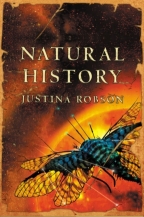Natural History
Justina Robson
Macmillan / Pan Macmillan
UK Hardcover First
ISBN 0-333-90745-0
Publication Date: 04-15-2003
330 Pages; £16.99
Date Reviewed: 05-08-03
Reviewed by Rick Kleffel © 2003

REFERENCES
COLUMNS
|
|
|
Natural HistoryJustina RobsonMacmillan / Pan MacmillanUK Hardcover FirstISBN 0-333-90745-0Publication Date: 04-15-2003330 Pages; £16.99Date Reviewed: 05-08-03Reviewed by Rick Kleffel © 2003 |
|
|
REFERENCES |
COLUMNS |
Science fiction is particularly well suited to explore solipsism. The genre offers all sorts of tricks, from the technical to the transformative, to aid the writer in a navel-gazing narcissistic descent into human minds freed from all considerations beyond their own bad selves. The result can be fiction that is laughably bad, or as in Justina Robson's case, laughably good. 'Natural History' declares itself free from the first font to the last word. This tale of the far future, when humanity has the ability to shape itself into any form imaginable, starts in a whirlwind of exotic imagery and down-to-earth characters. Though Robson has a serious sense of purpose and lots of serious speculation in store, she unrolls it with a welcome light touch. She keeps the action moving along briskly at the event and conceptual horizons.
The humanity on display in 'Natural History' is anything but natural. Robson's vision of the far future is of a world divided into the Forged and the Unevolved - that's us. The Forged are humans shaped into all manner of inhuman creations - from spaceships to birds, to huge hives of insect-like minds. Created by the Unevolved, the Forged now wish to seize independence from them. When Isol Voyager, a Forged spaceship built to be alone in deep space encounters an alien element, it sets in motion the means by which the Forged may achieve their goal. Of course, this may not be in the best interests of the monkeys - or the Forged themselves. It all depends on how important your humanity is to you, even if you're no longer human.
Robson's future is garish and bizarre to the edge of comprehensibility. Her writing is extremely strong. Her language captures the aliens that still consider themselves human and reigns them in to the reader's imagination. She unravels one Big Idea after another and keeps the reader riveted with a sense of humor and urgency. Robson's creations are on the wild side of science fiction, enormous terra-forming colossi, honorable avians who have designed AI virtual worlds so that the Forged can enjoy forms beyond those they were designed with, cyborgs and degraded vultures with a sick sense of humor.
Robson matches her language to each of the many characters so the readers can enjoy each piece of the puzzle. This book is often like a wonderful buffet of the bizarre, with images shuttling by so fast a re-read seems like something to look forward to. What makes all this hang together is a rather large cast of characters - for such a short book - each of whom takes on a pleasant and distinct shape in the reader's mind. From Isol Voyager, the insect-shaped spaceship illustrated nicely on the cover to Zephyr Duquesne, the unevolved archeologist sent to study an alien planet, each creation offers something to look forward to.
Robson's plot ponders absolute power, extra-dimensional physics, race relations and the definition of identity. Readers who enjoyed the glorious days of Arthur C. Clarke and Stanislaw Lem's extra-terrestrial explorations will find themselves in science fiction heaven. Robson does the alien better than most writers out there - no matter how far out there they are. Most importantly she has fun on every level. Her language is as chameleonic as her characters. She's as funny or poetic as the situation requires. She can take a complex idea and play it out in a conversation between two absurd and lurid characters in a way that makes everything hang together. She apparently loves all her characters, and manages to make the reader love them as well. The fact that they're all so different makes it easier to keep track of who is what and who is doing what. There's a lot to keep track to in this rather dense book. But the density keeps it short, keeps it on topic, and keeps the feeling of novelty so important to science fiction.
'Natural History' gets a lot of work done in short amount of time. Robson's succinct narrative covers ground that if dealt with in more detail could seem ponderous. In her hands it all seems firmly in the gee-whiz territory that we all hope for when first encounter science fiction. It's fresh, it's funny, it's entertainingly thought provoking. 'Natural History' is the kind of fun that brings new fans to science fiction - and keeps the old ones coming back for more.